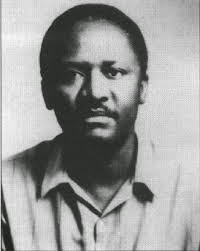Scorpion-tail tongue and razor-sharp pen. Okot p'Bitek

p'Bitek is and will always be a timeless colossus in the east African literary scene; his sharp and examining mind has had him referred to as the writer with the Scorpion-tail tongue and razor-sharp pen . This is a fact. His works; some of which remain unfinished like the much anticipated 'Song of Soldier' and the classic 'Wer pa Lawino' - Song of Lawino , whose original 1956 version of only 32 pages is found at the University of Nairobi library and is only available for restricted use; are very much sought after. My favorite work from Okot is a collection of essays - 'Artist The Ruler' Heinemann Kenya 1986. In this collection; to which Okot attached great importance, is a collection of essays to which Okot contends that all foreign missions (whether christian or Islamic) and foreign political ideologies (whether Capitalism or Socialism) have failed and will never be living philosophies in the lives of black African peoples. He goes ahead to expound on...
